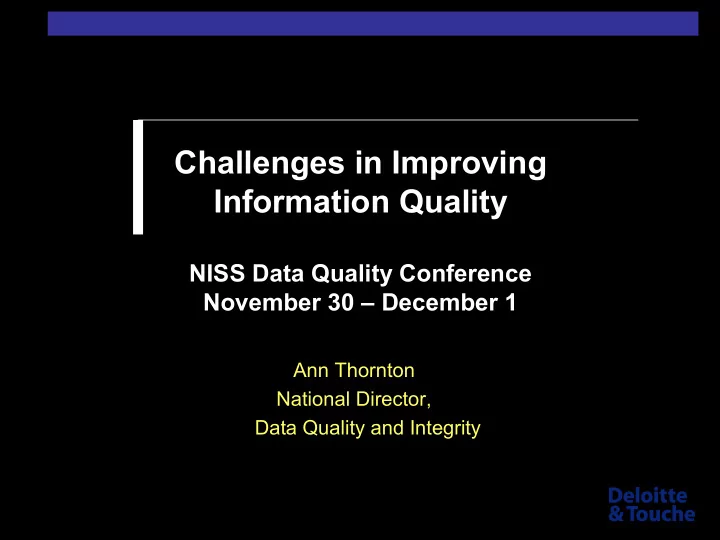

Challenges in Improving Information Quality NISS Data Quality Conference November 30 – December 1 Ann Thornton National Director, Data Quality and Integrity
Deloitte & Touche Perspective on Information Quality • Inclusion within system implementation methodologies – Enterprise Resource Planning (e.g., SAP, PeopleSoft) – Customer Relationship Management (e.g., Janna) • Data Quality and Integrity as a part of Enterprise Risk Services – Data Quality Services – Business Intelligence Services
Defining the Importance of IQ Ongoing Assessing Measurement & IQ Monitoring Addressing IQ Problems
Defining the Importance of IQ The “IQ Environment” • IQ Environment important (English) • Importance of the “softer side” of data quality – Facilitated workshops – Establishing an IQ task force – Changing the IQ environment may be political and require “change management”
Defining the Importance of IQ The Problem of Ownership • Information quality should be defined from the perspective of the information consumer (Wang) • Information consumer does not control the generation (hence quality) of the information.
Defining the Importance of IQ Costs vs. Benefits • Practitioners continually need to compare the benefits of IQ to the costs of process improvement. • People usually DON’T KNOW how to measure the benefits of IQ.
Defining the Importance of IQ Research Questions • How to measure the value of a management report? – What is the value of a report that is 95% accurate vs. 90% accurate? How do you obtain the measure “95% accurate” ? – Under what conditions is this question possible to answer? – How to approach the problem?
Defining the Importance of IQ Ongoing Assessing Measurement & IQ Monitoring Addressing IQ Problems
Assessing IQ Subjective Assessments • Questionnaires discussed in the literature • Benefits of facilitated workshops & interviews – Interview information producers and consumers – Weigh different priorities, perspectives – Subjective scoring on IQ issues can be very different from person to person
Assessing IQ Data Analysis T ESTS D ESCRIPTION E XAMPLES Base • Simple edits based on field type • Numeric field must be numeric (individual field contents) • Required fields are not blank/null Range • Business knowledge applied to an • Record Code is blank, ‘08’, ‘06’ or individual field (individual field ‘38’ content ranges) • Plan indicator field only contains ‘P’ • Industry norms • Amount field has amounts >= 0 • Specific business rules • State field must contain a valid state Intrafile • Business knowledge applied to two or • Debit/credit indicator is 1 for debit, 9 more elements in the same file for credit • Cost amount is less than the Sell amount • Record count field in header matches the number of records in the file Interfile • Business knowledge applied to two or • Employee number is valid more elements in different files • All customers have a Contract and Scheduling Agreement • A Bill of Material Records exist for all final assembly materials in the Material Master System / Process • Checks based on timing and • One district only goes to one region completeness of data and/or system • Calculate statistics on the monetary interfaces amount field to identify anomalies • Thorough set of tests time-consuming!
Assessing IQ Risk Assessment 0.80 0.60 Journal Voucher 1 - Level of 0.40 Labor Control Material Master Distribution 0.20 API 0.00 0.00 0.25 0.50 0.75 1.00 Inherent Risk • Risk assessments can be used to prioritize work effort.
Assessing IQ Finding Outliers • Techniques not understood • Advice of a data warehousing expert: – We will decide that today's sales total is reasonable if it falls within 3 standard deviations of the mean of the previous sales totals for that department in that store.
Assessing IQ Research Opportunities • Applying known methods to real-world data – Univariate methods – Other methods (e.g., Mahalanobis distances) • Finding better methods: – Better ways to find outliers in categorical variables – Data mining in reverse? (Cluster analysis, Association rules) – Convex hulls?
Defining the Importance of IQ Ongoing Assessing Measurement & IQ Monitoring Addressing IQ Problems
Addressing IQ Problems Root Cause Analysis • Finding and correcting problems at the source through root cause analysis is an acknowledged best practice (English, Redman). • Reluctance, in practice, to fix problems at the source
Addressing IQ Problems Research Opportunities • Statisticians are trying to find better ways to deal with bad data (e.g., regression-based imputation). • How much effort should go into “repairing” bad data vs. demanding, facilitating, and researching better data collection?
Defining the Importance of IQ Ongoing Assessing Measurement & IQ Monitoring Addressing IQ Problems
Ongoing Measurement & Monitoring Obstacles • Organizations lack summarized measurements / scores for data quality • Without a summarized measurement, tough to prove “payoff” of root cause analysis and corrective actions • Organizations hindered by: – Organizational politics – Lack of understanding of data quality metrics
Ongoing Measurement & Monitoring Research Opportunities • AGAIN: How to measure data quality? • How to produce data quality metrics that can be summarized and monitored? – Technical issues of threshholds, appropriate summarization – May require methodologies with subjective components (like a financial statement audit)
Thank you!
References for the Practitioner • Larry English – Improving Data Warehouse and Business Information Quality • Thomas Redman – Data Quality for the Information Age • Richard Wang, Kuan-Tsae Hung, Yang W. Lee – Quality Information and Knowledge
Recommend
More recommend